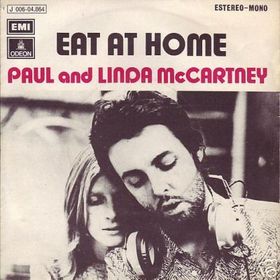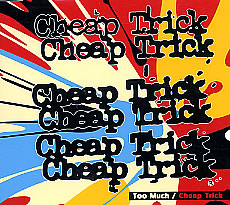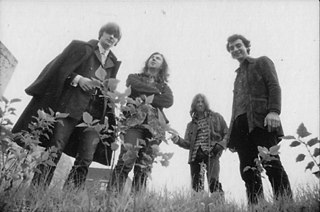
Accompaniment is the musical part which provides the rhythmic and/or harmonic support for the melody or main themes of a song or instrumental piece. There are many different styles and types of accompaniment in different genres and styles of music. In homophonic music, the main accompaniment approach used in popular music, a clear vocal melody is supported by subordinate chords. In popular music and traditional music, the accompaniment parts typically provide the "beat" for the music and outline the chord progression of the song or instrumental piece.

"Money Changes Everything" is a song by American rock band the Brains from their eponymous debut studio album (1980). Originally released in 1978, the song was reissued as the lead single from the album in 1980, by Mercury Records. Frontman Tom Gray is credited as the sole writer of the song, while production was collectively helmed by the Brains and Bruce Baxter. The song was popularized in 1984 by Cyndi Lauper, who released a cover version of the song as a single from her debut studio album, She's So Unusual (1983).

Mick Turner is an Australian musician and artist. He is the founding mainstay guitarist for Dirty Three and has had art exhibitions around Australia and internationally. Previously he was a member of the Sick Things, the Moodists (1983–84) and Venom P. Stinger. He has released four solo studio albums, Tren Phantasma (1997), Marlan Rosa (1999), Moth (2003) and Don't tell the Driver (2013).
Feedtime is an Australian noise rock band from Sydney, New South Wales, that was initially formed as a duo in 1979 by Rick Johnson on guitar and vocals and Allen Larkin on bass guitar and vocals. They soon became a trio with various drummers until 1982, when they were joined by Tom Sturm. This line-up issued four albums, Feedtime, Shovel, Cooper-S and Suction, before disbanding in February 1989. They reunited in 1995 with Johnson and Larkin joined by the latter's younger brother, John Larkin, on drums for another album, Billy, before disbanding again in 1997. The Rick-Al-Tom line up reunited again, in 2011.

"Flight of Icarus" is a song by the English heavy metal band Iron Maiden. It was their eighth single, the first from their fourth studio album, Piece of Mind (1983), and their first in the United States, where it was one of their few with substantial airplay, peaking at a personal best No. 8 on the Billboard Top Album Tracks chart. It was a lesser success in the UK, peaking at No. 11 on the UK Singles Chart.

"Eat at Home" is a 1971 single by Paul and Linda McCartney that also appeared on their album Ram from the same year. The song, a standard rock number, features McCartney on lead vocals, electric guitar and bass, and Linda McCartney performing backing vocals.

"No Matter What" is a song originally recorded by Badfinger for their album No Dice in 1970, written and sung by Pete Ham and produced by Mal Evans.
"Cirrus Minor" is a song written and performed by Pink Floyd. It is the first track on their 1969 album Soundtrack from the Film More. The song would later be released on the compilation album Relics.
Big Dipper are an American indie rock band who formed in Boston, Massachusetts, United States, in 1985 by former members of Volcano Suns and the Embarrassment. They released four studio albums between 1987 and 1990, before splitting up. The band reunited in 2008. They were described in a New York Times article as "musical contortionists: they love to toy with extremes, juxtaposing ferocious guitar noise with celestial vocal harmonies or planting a delicate melody in jagged rhythm".
The Green Pajamas are a musical group from Seattle, Washington. They formed in the spring of 1984 when Jeff Kelly and Joe Ross recorded and released their first album, Summer Of Lust. They are probably best known for the regional hit single "Kim the Waitress".

Nikola Čuturilo, also known as Čutura is a Serbian rock musician. He is known as a guitarist for the band Riblja Čorba, as well as for his solo work.
Tom Kazas is a composer-songwriter, record producer, film maker and a post-utopian.
Pop Mechanix is a New Zealand-based pop music band that played in New Zealand and Australia from 1979 to 1988. Their single "Jumping out a Window" reached number 87 of the all-time top 100 singles for APRA NZ, and number 12 in the all-time top 50 singles for The Press

Ruž was a Serbian and Yugoslav pop rock band from Belgrade.

"Too Much" is a single by American rock band Cheap Trick, released as the third and final single from their 2003 album Special One.

Bucketfull of Brains was a London-based music magazine, founded in 1979 and published until 2015. An associated record label was launched in 2010.
The Other Kids was an American alternative pop band formed in Madison, Wisconsin in 1985 by Steve Watson, Allyn Watson, and Chris Fink. One of the most popular Madison rock bands of the mid-to-late 1980s, The Other Kids disbanded in 1992, just as the alternative pop sound they were known for began to break into the commercial mainstream. The Milwaukee Shepherd called The Other Kids "probably Wisconsin's best classic pop-rock band, working those Alex Chiltonesque melodies together with empathetic intelligent lyrics, edgy guitars and a solid beat." The band's sound was a melodic mixture of power chords influenced by classic bands like The Who and the pure, guitar pop of The Hollies.
"Gypsy Rider" is a song written by Gene Clark, and performed by Clark and Carla Olson on the album So Rebellious a Lover, released 1987. The song was released as the A-side on a promo single the following year, given away for free with issue No. 24 of Bucketfull of Brains magazine. The B-side was "Flyaway" performed by The Seers.

The Moffs were a psychedelic rock band formed in Sydney in 1984. They are perhaps best known for their 1985 song Another Day in the Sun, that attracted local and international underground attention. Led by Tom Kazas, they incorporated many styles during their five-year career: psychedelic rock, progressive rock, blues rock, early post rock, atmospheric rock, 1960s and 1980s pop, free improvisation, impressionistic lyrics, Greek folk music styles, experimental composition and repetitive minimalist structures. The band's name was invented by misspelling the word 'moths'.
Thomas Howard Stevens was an American bassist, guitarist, singer, and songwriter, often associated with the Paisley Underground and alternative country movements as bassist for roots rock band the Long Ryders. He was a member of Magi and Danny & Dusty, and recorded as a solo artist. In his solo work, Stevens incorporated elements of folk rock, country, psychedelia and garage rock into his music, and released what music reviewer Stewart Lee calls "fascinatingly different solo albums." Stevens was based in Los Angeles in the 1980s, but later returned to his native Indiana.











